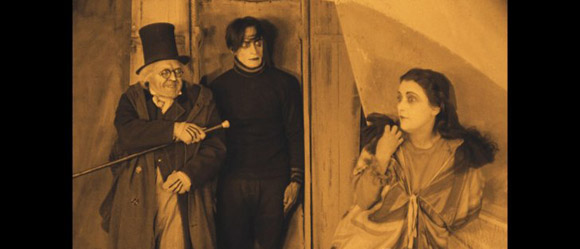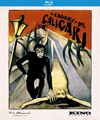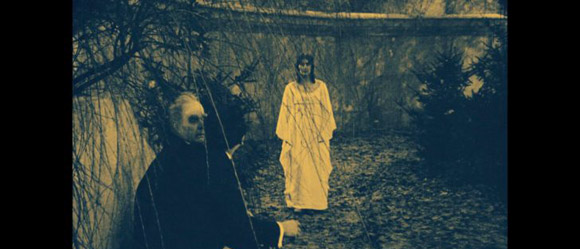{jatabs type="content" position="top" height="auto" skipAnim="true" mouseType="click" animType="animFade"}
[tab title="Movie Review"]

{googleAds}
![]()
The Cabinet of Dr. Caligari is the tale of a madman told through the eyes of another madman; a film so daunting it’s horrifying. Yes, here it is: the very first horror film and still its influence is felt. There is no argument there. It is also, with its exaggerated backgrounds and sharp angles, German Expressionism at its most panicked and creative, reflecting the secret fears of postwar Germany. Directed by Robert Wiene and written by Hans Janowitz and Carl Mayer, the silent horror film has been deconstructed to death by scholars and historians. Its status as a classic has been firmly established by critics, connoisseurs of the cinema, and film students, discovering it for the first time as an assignment. Never before; however, has it been seen this achingly beautiful.
Thanks to the efforts of Kino-Lorber, The Cabinet of Dr. Caligari has been granted a new life. No longer does the grime of postwar recession hold it back from its full expressionistic glory. This authoritative edition of Wiene’s film is a 4K restoration that was scanned from the preserved camera negatives at the German Federal Film Archive and corrects the color plates and speed of the original presentation. The results of this intensive process are radical and the stunning clarity compounds the movement’s reaction against presenting the world as it appears. Its debut on blu-ray makes it the only version you should ever see.
The narrative is about a demented doctor (Werner Krauss) and a carnival sleepwalker (Conrad Veidt) who commit a series of ghastly murders in a small community. In this soundless world, all light has been abstracted in favor of stretched shadows and snaky roads. This is a realm of obscure nightmares. Based upon the authors’ anti-government stance, the film can be seen as a condemnation of state authority and the pressure of compulsory military service as Francis (Freidrich Feher) rails against the insanity of Caligari. Of course, all of this is hidden inside the frame story – inserted against the authors' wishes – of an unreliable narrator which turns their little revolution into an act of submission.
Also starring Rudolph Lettinger, The Cabinet of Dr. Caligari expertly reflects the depressive chaos of Germany’s postwar conditions. Exaggerated as the set design is, look closely at the scenes in the movie and you will see adults – in complete avoidance of their new responsibilities – absolutely losing their minds as they escape reality and embrace the funhouse mirrored reflections they see. Only Expressionism – a movement that embraces the conveyance of emotions through visible extremes – could capture the breakdown of many Germans felt at the time.
The twisted shadows in the movie are elongated and secured onto set walls with paint. The streets in the backgrounds wrap crookedly around homes whose designs make little sense. And yet, in the context of the pervuasive mood of the film, it all makes perfect sense. The clarity of the newly minted transfer might make the “stage” of The Cabinet of Dr, Caligari feel less of a nightmare and more like the spare painted flats of an early 20th century stage production but the intension is still palpable.
Enter the cramped and unsettling world of Dr. Caligari and witness firsthand how postwar life was perceived in the new medium of film. This film, originally released in 1920, is responsible for ushering in a new era of German Expressionism on film, a period that produced such classics as Nosferatu and Metropolis so sleepwalk to your movie collection and note its absence.
This is the disc you want.
[/tab]
[tab title="Film Details"]

MPAA Rating: Unrated.
Runtime: 67 mins
Director: Robert Wiene
Writer: Carl Mayer, Hans Janowitz
Cast: Werner Krauss, Conrad Veidt, Friedrich Feher
Genre: Horror
Tagline: A THRILLING FANTASTIC PHOTO-PLAY.
Memorable Movie Quote: "I must know everything. I must penetrate the heart of his secret! I must become Caligari!"
Distributor: Kino Video
Official Site:
Release Date: March 19, 1921
DVD/Blu-ray Release Date: November 18, 2014
Synopsis: Dr. Caligari's somnambulist, Cesare, and his deadly predictions..
[/tab]
[tab title="Blu-ray Review"]

![]()
Blu-ray Details:
Available on Blu-ray - November 18, 2014
Screen Formats: 1.33:1
Subtitles: English
Audio: Music: DTS-HD Master Audio 2.0; Music: DTS-HD Master Audio 2.0
Discs: 50GB Blu-ray Disc; Single disc (1 BD)
Region Encoding: Locked to Region A
Administered by the F.W. Murnau Foundation, Kino-Lorber has mastered this print from a high-resolution 4K scan largely from the original 35mm camera negative. Some footage missing from the camera negative has been filled with footage from other prints. According to the introduction, the entire first reel is missing from the negative. However, the conflated footage is from an excellent 35mm print, which is of such high-quality that it wows the viewer with its clarity. The tinting also looks pretty amazing, with a depth and richness to it that makes it look integral to the image rather than something slapped on the top. Just as importantly, though I'm sure digital tools were integral to this restoration, their use has been judicious, resulting in a total lack of problematic digital artifacts. Presented with the original German language art intertitles that were preserved as flash titles in the source material, the movie is literally new in almost every way. English language subtitles are available as a viewing option. This presentation features a music score performed by the Studio For Film Music at the University of Music, Freiburg, with an optional alternate music score by Paul D. Miller (DJ Spooky) and is presented in Dolby Digital 2.0 stereo sound.
Supplements:
Commentary:
- Unfortunately, the excellent full-length commentary by author and film historian David Kalat is not a part of this release. I know. I don’t understand it either.
Special Features:
Supplemental materials include the German documentary Caligari: How Horror Came to the Cinema, a booklet essay by Kristin Thompson, an image gallery, and a restoration demonstration. As would be expected, this edition – in spite of a lack of commentary - is highly recommended.
- Caligari: How Horror Came to the Cinema (52 min)
- Restoration Demonstration (8 min)
- Image Gallery
[/tab]
[tab title="Trailer"]
[/tab]
{/jatabs}





























